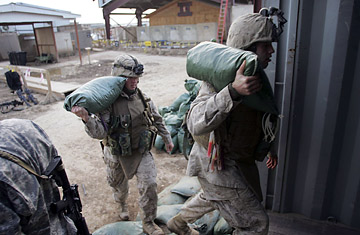
Army soldiers carry sandbags at Camp Ramadi in Iraq's Anbar province.
I had to fill a sandbag before I could enter the chow hall this morning to eat breakfast. It's a new rule at this forward operating base south of Baghdad where I've been traveling with soldiers from the 1st Battalion, 501st Parachute Infantry Regiment for most of the week. I guess I probably could have said no, argued that I was a civilian or that by doing so I would break some sort of magical neutrality and become a combatant. But I filled it with whatever patriotism I could muster at 6:30 a.m., and then went about my business as a reporter and asked everyone around me, "Why?"
"They're for OP-3," most of the troops said with a certain pride before tossing their heavy green sacks onto ever-growing pyramids and walking smartly off to chow. This is the story of how I tracked my sandbag to OP-3.
First, a little history of OP-3. Early last week a ragtag army of civilian gunmen, many of them former Sunni insurgents under the command of a former insurgent leader from the anti-American Islamic Army of Iraq, pushed through the lush farmland on the east bank of the Euphrates River and drove 100 al-Qaeda fighters out of the brush like quail. Once out in the open and on the run, the American paratroopers took over the fight as the Iraqi militia backfilled into checkpoints and outposts along the main river road and the fields that border it. On Tuesday night, the paratroopers advanced to a logical northern limit and assaulted a school that the al-Qaeda fighters had been using as a makeshift hospital and command post, finally driving the fighters out after killing and wounding an untold number of them.
With the help of Iraqi police, Iraqi Army and the newly formed civilian militia, the paratroopers occupied the school as a frontline outpost and called it "Observation Post Three," or "OP-3." And for the rest of the week, sometimes under fire and always under observation by al-Qaeda fighters hiding in the thick tree line just 400 yards away, the small band of paratroopers have been holding their ground. They have lost one man already, though not to enemy fire. He was crushed between two vehicles as they brought in building supplies and, yes, the sandbags to bolster their position during the precarious first night.
The route from the paratroopers' base to OP-3 is a hazardous affair. But on Friday, after a day's relative calm, I decided I could chance leaving the base and took the paratroopers up on their offer to show me where my sandbag wound up. First there were several checkpoints near villages manned by some of the new civilian gunmen organized by local sheiks and paid around $300 a month by the Americans. The first group wore the requisite armbands that are supposed to mark them as "friendly." They have cleared the road of bombs, the soldiers told me — they uncovered two along the route already that day.
The road from there cut through talc-like dust that produced a general haze and made the river a mirage and painted the setting sun a persimmon orange. Beyond an Iraq Army checkpoint, we passed what was left of an Iraqi Police station that was destroyed three months ago by a dump truck filled with shoes and explosives. The blast left a crater that several Humvees could park in and collapsed most of the compound, killing at least 13 Iraqi guards and leaving an impressive selection of footwear scattered about the river bank. The ruins stood there in the dusk like a monument to al-Qaeda's recent past.
As we got within a hazy half-mile of OP-3, dozens of armed men wearing tunics and head scarves milled around totting Kalashnikov rifles and looking like they were gearing for an operation. The soldiers with me seemed a bit nervous at the sight of so many Iraqis — many more than their own number — carrying guns. "Friendlies," they assured me, before one of them laughed.
Then, suddenly, in a clearing with a breathtaking riverfront view to the west and thick palm groves and what could pass for jungle scrub to the north and on the eastern flank, OP-3 appeared in the haze. It wasn't much. The school was obviously dilapidated to begin with and then badly blown apart in the recent fight. Sandbags like the one I'd filled earlier back at the base were stacked into holes and doorways and reinforced positions on the roof. More were being trucked over.
Inside the schoolyard, dirty-faced soldiers clustered around a sergeant who briefed them on the night's security plan. Outside, a small foot patrol snaked silently out into tall grass to probe the enemy's strength to the north and east. Iraqi civilian volunteers held positions on the opposite riverbank, where soldiers said they had repelled an al-Qaeda boat-borne assault the night before. The paratroopers were in for a long night.
As darkness descended on this odd little corner of the war, OP-3 and the soldiers that manned it were truly on the extreme edge of the American mission here. And when I returned to the base for a late meal before a goodnight sleep, I had to wait in a long line for a shovel to fill another green sandbag. With their fellow paratroopers out there on the fringe, no one here had to ask why.
